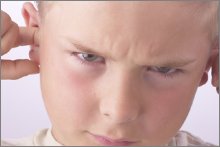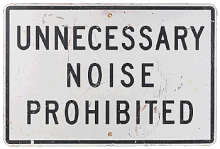The Federal Noise Laws: Yes There are Laws to Reduce Noise Pollution & Here are the Essentials
by www.SixWise.com
Airports, traffic, construction equipment, loud music (from
cars or nightclubs) and barking dogs all have something in
common: they contribute to noise pollution.
|

Exposure to loud noise over time has been linked to
increased risk of cardiovascular disorders, learning
deficits in children, stress, and diminished quality
of life, according to Congress.
|
Noise
pollution is not only unpleasant, it's dangerous. According
to the National Institutes of Health, some 65 million Americans
are exposed to noise levels that can get in the way of work
and sleep, and 25 million people are at risk of noise-related
health problems.
To curb noise pollution, prior to 1982 the U.S. Environmental
Protection Agency (EPA) ran the Office of Noise Abatement
and Control (ONAC), which regulated noise-control activities,
required product labeling, facilitated the development of
low noise-emission products, coordinated federal noise reduction
programs, assisted state and local abatement efforts, and
promoted noise education and research.
However, funding for ONAC ceased in 1982, and the EPA's authority
has since been shifted to state and local governments, who
were deemed the best able to handle noise issues. Nonetheless,
two primary federal laws still remain in effect today:
-
The Noise Control Act of 1972: Congress declared that
it is the policy of the United States to "promote
an environment for all Americans free from noise that
jeopardizes their health or welfare." The major sources
of noise regulated in the Act were transportation vehicles
and equipment, machinery, appliances, and other products
in commerce.
-
The Quiet Communities Act of 1978: Authorized the EPA
to provide grants to state and local governments for noise
abatement.
|
Relieve Noise-Related Stress with
The Pure Relaxation CD: Guided Meditations for Body,
Mind & Spirit
This is the #1 relaxation CD on the market today ...
at an incredible price!
The Pure Relaxation CD will calm your mind, soothe
your emotions and create a state of deep relaxation
in your body. Using these guided meditations regularly
will help you to live in a more relaxed way. You will
notice when you are becoming tense and start to relax
spontaneously.
You will be amazed with how, by regularly listening
to the CD, it has a powerful ability to help you relax
and deal more effectively with stress throughout the
day, every day.
"You are creating an oasis in a very noisy,
busy world!"
-- Pat Foth, Retired Pet Store Owner, MI
Order
The Pure Relaxation CD Now and For a Limited Time: GET
FREE Shipping Anywhere in the World!
|
Bills to restore funding to the EPA's ONAC have surfaced
as recently as 2003 (The Quiet Communities Act of 2003), but
most noise regulations still fall into the hands of state
and local governments.
In one attempt to secure $21 million in funding for ONAC
between the years of 2004 and 2008, Congress found, according
to The Quiet Communities Act of 2003, that:
-
Approximately 28 million Americans are afflicted with
some hearing loss, and it has been estimated that 10 million
of these impairments are at least partially attributable
to damage from exposure to noise.
-
For millions of Americans, noise from aircraft, vehicular
traffic, and a variety of other sources is a constant
source of torment.
-
Millions of Americans are exposed to noise levels that
can lead to sleep loss, psychological and physiological
damage, and work disruption.
-
Chronic exposure to noise has been linked to increased
risk of cardiovascular disorders, learning deficits in
children, stress, and diminished quality of life.
-
Excessive noise leading to sleep deprivation and task
interruptions can result in untold costs on society in
diminished worker productivity.
State and Local Noise Ordinances: From Quiet Hours to
Noisy Mufflers
|

In many cities, any "unnecessary noise" or
"unreasonably loud" noise are violations of
noise ordinances and subject to fines and other punishments.
|
While the federal government still limits noise levels for
aviation and other transportation venues (railways, etc.),
state and local governments have varying noise ordinances.
To find out the details on noise law in your city, check
out your city's Web site. Generally speaking, however, police
typically enforce noise ordinances by taking a decibel reading
to find out if the noise is really loud enough to break the
law.
Some of the more common noise ordinances out there include:
-
Citywide quiet hours, such as after 10 p.m. on weekdays,
or before 8 a.m. or 9 a.m. on weekends
-
Honking car horns for a non-danger situation
-
Barking dogs at night
-
Motorcycle noise
-
Continuous noise beyond a certain decibel level (such
as from a neighbor's noisy party or local bar)
For example, three cities have recently cracked down on motorcycle
noise. In New York City, motorcycle riders can be fined a
minimum of $440 for having a muffler or exhaust system that
can be heard within 200 feet.
In Denver, just putting a muffler on your motorcycle that's
made by someone other than the original manufacturer, and
may therefore be louder, can cost you a ticket of $500.
And in Lancaster, Pennsylvania, motorcycle and vehicle drivers
alike can be fined $150 or more for "drawing attention
to themselves," such as by revving their engines or doing
hard accelerations.
Beyond vehicular noise, though, in most areas of the country
police officers are given the freedom to make judgment calls
on anti-noise ordinances. Many state ordinances simply say
that "unreasonably
loud" or "unnecessary noise" are violations.
Protecting Yourself and Your Family From Noise Pollution
What can you do to bring some peace
and quiet to your environment? Here are the top nine tips:
-
Wear earplugs in noisy places
-
Turn down the volume on radios, personal headsets and
TVs
-
Try muting your TV during the commercials, or leaving
it off all together and reading a book instead
-
Sound-treat your home by putting heavy curtains on windows,
rugs on the floors and sealing all air leaks
-
Consider adding acoustical tile to your ceilings and
walls
-
Put on some light music to buffer outside noise that
you can't control
-
Use sound-blocking headphones to listen to music/TV
without the disturbance of outside noises, and without
disturbing those around you
-
Look for quieter home appliances
-
Take a drive in a rural area to escape city noise for
a day
Recommended Reading
Noise
Pollution: How Bad is it, How Bad Could it Get, What are the
Effects?
LISTEN
UP! Exposure to Loud Noise May Cause Tumor & Other Health
Risks
Sources
The
Quiet Communities Act of 2003
TheDailyTimes.com
Noise Pollution
Clearinghouse
EPA
Public Access